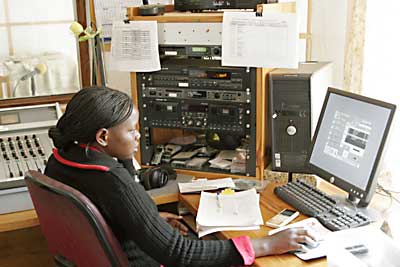
 |
jescom | meetings | documents | links | sjweb |
Radio Chikuni- a voice of hope in Zambia

February 2003
Andresz Lesniara first thought of establishing a radio station when a flooding river cut the mission at Namwala off from outside world. He conceived radio as a way of keeping in touch. The late Jesuit bishop Paul Lungo initially asked him to establish a station for the whole diocese, but Lesniara thought the size of the diocese would cause problems and he preferred to maintain the focus of a single parish. Discussions about the radio continued during 1998-99.
He wrote over 2,000 letters soliciting funds to pay for the station. They got off the ground when an Australian woman sent in a surprise donation of 100,000 Australian dollars; she had seen the letter about the radio while she was waiting for spiritual direction. Local people donated materials and labor to construct the building that houses the radio. Lesniara claims that people feel pride of ownership because they built the radio station
.As a community-based station, Radio Chikuni addresses everyone, not just Catholics, although it is an explicit work of the parish. It provides access to information for people who have no resources and otherwise lack access. One example of this access is the radio school. It extends the reach of the parish priests (who have 21 stations to cover, scattered over wide rural area.)
The radio's logo is a snail above which is written a Tonga proverb based on the fact that the first rains of the season causes the snails to start to crawl. The proverb refers to a visitor who comes to your house and brings news, like a community radio station.
The loss of teachers due to AIDS pushed the parish to address the lack of education in the villages. Radio Chikuni offers up to two hours of programming per day for each of the four grades that they offer, in cooperation with the Zambian government which is working with USAID. The parish at Chikuni was the first to respond to the Ministry of Education's invitation to all churches in the country to provide. Currently about 1,200 students participate in the radio schools which are trying to complement regular teacher-led schools, not compete with them. Radio schools also fit into the rural schedule: most children have to work in the fields and so are only free to study during the mid-day break.
Radio schools are related to the parish stations, with students gathering either in the chapel or out of doors in the shade of a tree. The parish asked each village to select two people who would be "mentors" by helping the students through the lessons heard over the radio. Mentors need to have finished at least 9th grade; they come to the parish each month for training. In addition, there are visitors who go to the schools to check on how classes are going.
Radio Chikuni has established several levels of community participation in the station: Listening Clubs: There are now about 55 clubs whose members listen to the radio, take workshops and write programs. They provide feedback about what airs and make suggestion for future programs. News Gatherers: adults in villages who gather local news and pass it to the station Media Scholars: young people who do a year-long internship during the period between finishing secondary school and getting the results of final exams that will determine if they can go on to tertiary education. The parish picks three boys and three girls each year and provides them basic training in computer literacy and radio production. If one of these scholars proves gifted, the parish will sponsor him or her for a three-year training program in Lusaka in return for a five-year commitment to workat the station.